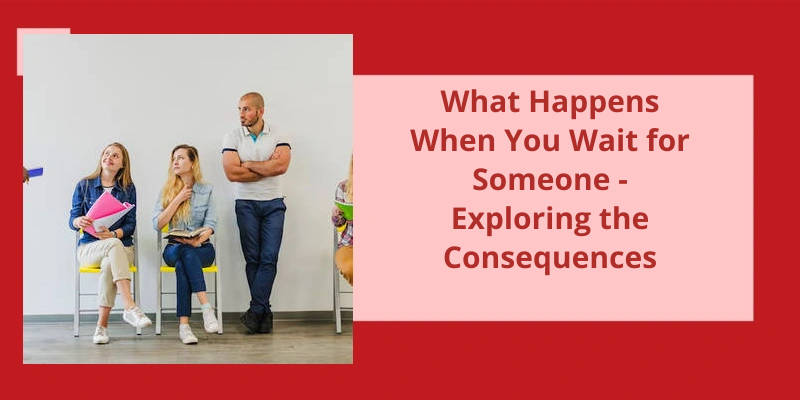When it comes to waiting for someone, the consequences can be far-reaching and diverse. Waiting can be emotionally draining, as it often causes stress, anxiety, and a sense of dissatisfaction. Whether you’re waiting for a romantic partner to commit, a friend to show up, or a family member to make amends, the act of waiting can take it’s toll on your emotional well-being. It can leave you feeling neglected, unimportant, and uncertain about the future of the relationship. Moreover, waiting for someone who doesn't want a relationship at all can have even more devastating consequences, as it sets the stage for heartbreak and disappointment in the long run. In this exploration of the consequences of waiting for someone, we will delve into the various impacts it can have on different aspects of life and relationships. From the toll it takes on your mental health to the potential damage it can inflict on your self-esteem and overall happiness, waiting for someone can be a precarious and sometimes detrimental experience. So, let's delve into the complexities of waiting, examining it’s effects and implications, and uncovering the underlying reasons why we find ourselves caught in this seemingly never-ending limbo.
What Is the Meaning of Waiting for You?
Waiting for someone can hold various meanings depending on the context. On a basic level, it signifies the anticipation of their arrival or presence. This anticipation could stem from longing, excitement, or even anxiety, depending on the nature of your relationship with the individual. When you wait for someone, you’re in a state of expectation, eagerly anticipating their arrival or something to occur as a result of their presence.
In terms of consequences, waiting for someone can affect individuals differently. The act of waiting often entails a delay or putting plans on hold until the person arrives or a particular event occurs. This waiting period can lead to frustration, impatience, or even disappointment if the waited outcome doesn’t meet expectations. Additionally, waiting for someone can impact ones productivity, especially if it involves waiting for an extended period without engaging in other activities.
It can create a sense of dependency, as individuals may rely on someone else to initiate or proceed with certain plans or actions. This reliance on others can sometimes foster a lack of autonomy or self-efficacy, as ones agency becomes tied to the actions of another. Conversely, waiting for someone can also highlight the importance of interpersonal connections and reinforce the significance of their presence in our lives.
It embodies a range of emotions, expectations, and consequences that can shape our experiences and relationships.
Coping Strategies for Waiting: Provide Practical Tips and Strategies for Individuals Who Find Themselves in a Situation Where They Are Waiting for Someone. This Can Include Suggestions for Managing Anxiety, Finding Ways to Pass the Time, and Maintaining a Sense of Independence.
- Deep breathing exercises
- Meditation or mindfulness practices
- Listening to calming music or podcasts
- Engaging in a hobby or creative activity
- Reading a book or magazine
- Writing in a journal or diary
- Playing games on a smartphone or tablet
- Taking a walk or doing light exercise
- Calling or texting a friend or family member
- Practicing positive self-talk and affirmations
- Setting goals or making plans for the future
- Organizing or decluttering personal belongings
- Exploring new interests or learning something new online
- Engaging in relaxation techniques, such as progressive muscle relaxation
- Using guided imagery or visualization exercises
- Doing puzzles or brain teasers
- Practicing mindfulness while waiting, focusing on the present moment
By patiently waiting in a relationship, you express your dedication and commitment to your partner. It shows that you value their thoughts and emotions enough to give them the space to make important decisions. Waiting allows them to witness firsthand how much you care, strengthening the bond between you both.
What Does Waiting Mean in a Relationship?
What does waiting mean in a relationship? It means having patience and understanding, and putting the needs and desires of your partner above your own.
However, waiting can also have it’s drawbacks. It can create a sense of uncertainty and insecurity, as you navigate the unknown territory of waiting and wonder what the outcome may be. It requires a high level of trust and confidence in your partners intentions, as you must believe that they’re genuinely using the time to evaluate the relationship and make a decision in it’s best interest. Waiting can also test your own patience and emotional resilience, as you may experience a range of emotions such as anticipation, frustration, and vulnerability.
It requires patience, understanding, and trust, while also carrying the potential for both positive and negative consequences. By giving your partner the time they need to make decisions and taking the opportunity for self-reflection, waiting can be a valuable journey of growth and self-discovery.
How to Communicate Effectively While Waiting in a Relationship
Effective communication is crucial in any relationship, especially when waiting for someone. While waiting, it’s important to express your feelings and concerns openly and honestly with your partner. This can help alleviate any anxiety or tension that may arise from waiting. Additionally, active listening plays a significant role in effective communication. By attentively listening to your partner’s perspective and feelings, you can understand their needs and address any issues that may arise. It’s also advisable to set expectations and establish boundaries during the waiting period. Openly discussing your needs and desires can help both partners feel secure and supported. Lastly, maintaining patience and understanding is key. Waiting can be frustrating, but practicing empathy and sympathy towards your partner’s circumstances can strengthen your bond and cultivate a healthier relationship overall.
Source: Should You Wait for a Partner Who’s Not Ready to Commit?
How Do You Stop Waiting for Someone You Love?
However, it’s an essential step towards healing and letting go. It’s important to recognize that waiting for someone who may never come back or commit to you can be emotionally draining and hinder your personal growth.
Another crucial step in stopping the waiting game is to focus on yourself. It’s time to shift your attention and energy towards your own happiness and well-being. Discover new hobbies, pursue your passions, and surround yourself with positive people who support and uplift you. This won’t only help distract you from your longing for that person but also allow you to rebuild your self-worth and confidence.
Moreover, it’s important to set healthy boundaries. If the person you love has consistently let you down or shown a lack of commitment, it’s vital to prioritize your own emotional well-being. Establish clear boundaries and communicate your needs and expectations. If they’re unable or unwilling to meet them, it may be time to break free from the cycle of waiting and move on.
Letting go of someone you love can be incredibly difficult, and it’s normal to experience a range of emotions such as sadness, anger, and grief. Allow yourself to feel these emotions and give yourself time to heal. Surround yourself with a strong support system, whether it be friends, family, or a therapist, who can help you navigate the process of letting go and moving forward.
Finally, practice self-compassion and forgiveness. Understand that letting go doesn’t mean that you’re weak or that you’re giving up on love. It means that you’re choosing to prioritize your own well-being and happiness. Forgive yourself for any mistakes or shortcomings during the waiting period, and have faith that love will enter your life again, whether it’s from the same person or someone new.
In this article, we will explore the psychology of waiting time and delve into the two distinct phases: active waiting, where engagement masks the passage of time, and passive waiting, where lack of control over the waiting period can impact our psychological state. Understanding the impact of waiting from a psychological perspective can help us navigate these situations more effectively and alleviate any potential negative effects on our well-being.
What Is the Psychology of Waiting Time?
We experience passive waiting in situations where we’ve no control over when someone will arrive or when a certain event will occur. This type of waiting can be quite frustrating and can lead to feelings of impatience, boredom, and even anxiety. Our minds tend to wander during passive waiting as we’ve no immediate task to focus on, and this can make the waiting time seem longer than it actually is.
When we actively wait for someone, the experience can be quite different. Engaging in an activity or task can help to distract us from the waiting time and make it more bearable. We might choose to read a book, watch a movie, or complete a crossword puzzle to pass the time.
Waiting for someone can also impact our sense of control and power. When we’re waiting for someone, we’re essentially giving them control over our time and our schedule. This can leave us feeling powerless and dependent on others, which can be uncomfortable for some individuals. It can also create a power dynamic in the relationship, with the person being waited on holding more control and authority.
“I’ll be waiting for you” is a common phrase used to convey the speaker’s commitment to wait for someone at a particular point in the future. While the exact time may not always be mentioned, the statement implies a willingness to be patient until the expected meeting or reunion occurs.
What Does I’ll Be Waiting for You Mean?
“What does Ill be waiting for you mean?”. This phrase typically signifies an individuals commitment to wait for another person at a specific point in the future. The exact time may or may not be mentioned, as it often relies on the context of the conversation or situation. By uttering these words, one is expressing their dedication to remain in a particular location until the anticipated arrival of the individual they’re addressing.
The phrase carries a sense of assurance, letting the other person know that the speaker is willing to patiently remain in place until their arrival, indicating a desire to spend time together or complete a joint endeavor. It implies a willingness to be patient, regardless of any potential delays or obstacles that may arise. This commitment suggests a deep level of trust, reliability, and dependability between the parties involved.
In many instances, this phrase is employed when there’s a predetermined meeting or appointment, such as awaiting the return of a loved one from a trip or expecting the arrival of a friend at a planned gathering. By assuring someone that “Ill be waiting for you,” it conveys a sense of anticipation, excitement, and the speakers eagerness to reconnect or engage in a shared experience. However, it’s essential to consider the circumstances and the relationship between the individuals involved to accurately interpret the true meaning and intentions behind these words.
Different Ways to Express Commitment in Waiting for Someone
- Being patient and understanding
- Continuously communicating and expressing support
- Showing loyalty and staying faithful
- Demonstrating consistency and reliability
- Being emotionally available and present
- Putting their needs and feelings first
- Making sacrifices and compromises
- Being willing to wait and not rushing the process
- Remaining optimistic and hopeful
- Respecting their boundaries and giving them space
- Offering reassurance and security
- Supporting their goals and dreams
- Planning and making future commitments together
Now onto the next part of the article, let’s explore some practical advice for when you’re single and waiting for love. It’s important to know yourself first and understand what you truly need in a partner. Being social and building a strong support network can also help in the waiting process. However, rushing into a relationship is never recommended. Take your time and make a list of your non-negotiables to ensure you find a compatible match. Remember not to take the process personally and feel free to date casually if you’re comfortable with it. Lastly, finding a hobby can’t only keep you occupied but also help you meet new people. Keep these thoughts in mind as we delve deeper into navigating singlehood and waiting for love.
How Do You Survive Waiting for Someone?
When you find yourself in the position of waiting for someone, particularly in the context of waiting for love, it can feel like an eternity. However, there are ways to survive this waiting period and make the most of your single life. The first and most important step is to know yourself. Take the time to truly understand your own needs, desires, and boundaries. This self-awareness will help you navigate the dating world with more clarity and confidence.
Additionally, it’s essential to be social during this waiting period. Surround yourself with friends and loved ones who support and uplift you. Engage in social activities that interest you and allow for opportunities to meet new people. While waiting for love, it’s crucial not to rush into relationships or settle for less than what you deserve. Remember that finding the right partner takes time, and it’s better to wait for someone who aligns with your values and goals.
Making a list of what youre looking for in a partner can also be helpful. Consider the qualities and traits that are important to you, and prioritize them accordingly. This list will serve as a guide when you do start dating, helping you weed out potential partners who may not be the best fit for you. It’s important not to take the lack of a romantic connection personally. Remember that everyones journey is different, and the right person will come along when the time is right.
While waiting for love, it’s perfectly okay to date and explore different connections. Use this time to learn more about what you like and dislike in a partner, and to gain valuable dating experiences. However, it’s crucial not to lose sight of your own personal growth and happiness. Finding a hobby or passion outside of dating can provide a sense of fulfillment and purpose. Whether it’s painting, hiking, or learning a musical instrument, engaging in activities that bring you joy will help you stay focused and content during the waiting period.
Coping With Rejection While Waiting for Someone
Waiting for someone can be a challenging experience, especially when that person is someone we care about or have feelings for. However, when we find ourselves waiting for someone who may never arrive or return our feelings, it can lead to feelings of rejection.
Rejection is a natural part of life, and while it may be painful, it’s important to remember that it doesn’t define our worth or value as individuals. Coping with rejection while waiting for someone requires self-care and acceptance.
One way to cope with rejection is to focus on self-improvement and personal growth. This can include pursuing hobbies or interests, setting goals, and investing time and energy in oneself. By shifting the focus inward, we can boost our self-esteem and remind ourselves of our own worth.
Another strategy for coping with rejection is to seek support from friends, family, or a therapist. Sharing our feelings and experiences with others can provide comfort and perspective, helping us to process our emotions in a healthy way.
Lastly, it’s important to recognize that waiting for someone who may never come or return our feelings isn’t a productive use of our time and energy. By letting go of the hope that things will change, we free ourselves to move forward and open up the possibility of finding someone who’ll appreciate and value us.
Conclusion
It can be an exhausting and draining experience, causing stress, anxiety, and feelings of dissatisfaction. The realization that the other person may not be as invested in the relationship as you’re can be disheartening and may lead to future heartbreak. Therefore, it’s essential to consider these potential consequences and evaluate whether waiting for someone is truly worth it in the long run.






